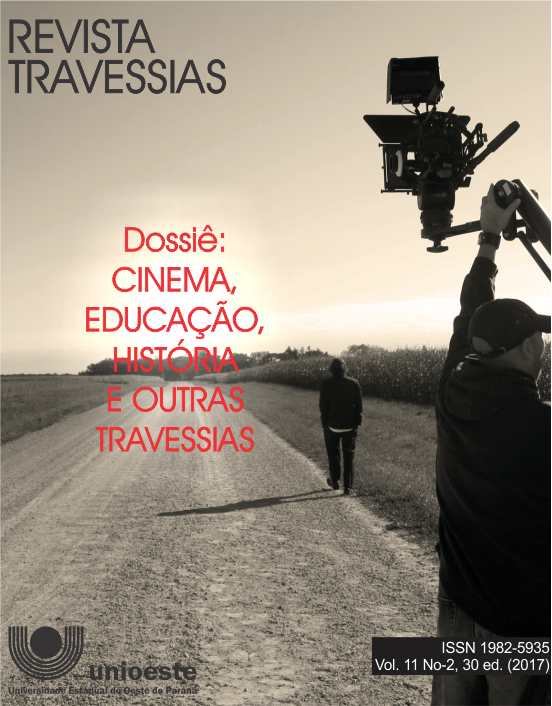Construção e desconstrução de estereótipos em Filhas do Vento
Palavras-chave:
Estereótipo, identidade, racismo.Resumo
No contexto social pós-moderno, conceituar identidade é um desafio, pois exige uma análise complexa e simbólica que resulta das mais diversas experiências históricas. A identidade é fragmentada, mas marcada por aproximações razoáveis, ou seja, identificações intersubjetivas criadas coletivamente a partir de um senso de pertencimento, conflitos e negociações. São inúmeros significados que excluem e incluem, categorizam e criam atributos para um determinado grupo. A partir desta perspectiva, o objetivo deste trabalho é analisar uma sequência do filme Filhas do Vento, dirigido por Joel Zito Araújo e lançado em 2005, identificando as estratégias narrativas utilizadas pelo diretor na desconstrução de estereótipos a partir da imputação de estereótipos irracionais que marcam e naturalizam as discriminações raciais, corroboram para sua invisibilidade social perversa e arbitrária, e estimulam a violência aos direitos sociais e étnicos da população afro-brasileira. Para isso, a análise fílmica será delineadapelos métodos apontados por Francis Vanoye, Anne Goliot-Lété, Laurent Jullier e Michel Marie.A fundamentação teórica será norteada pelas discussões teórico-conceituais de Stuart Hall, Pierre Bourdieu, Florestan Fernandes e Joel Zito Araújo. O presente trabalho resultou em uma análise que desconstruiu estereótipos naturalizados culturalmente na sociedade, a partir da identificação e reconhecimento dos mesmos, afirmados pelo diretor na sequência fílmica e perpetuados em uma sociedade que persiste na ideia falaciosa de democracia racial. Além de reforçar o caráter de ação afirmativa do filme, que coloca o negro no protagonismo na constituição do elenco todo negro como na discussão de questões referentes à negritude.
Downloads
Referências
ARAÚJO, Joel Zito. A negação do Brasil: o negro na telenovela brasileira. São Paulo: Senac, 2000.
ARAÚJO, Joel Zito. A força de um desejo: a persistência da branquitude como padrão estético audiovisual. Revista USP, São Paulo, n. 69, p. 72-79, mar./maio 2006. Disponível em: <http://www.revistas.usp.br/revusp/article/view/13514>. Acesso em: 30 set. 2016.
ARAÚJO, Joel Zito (Org.). O negro na TV pública. Brasília: Fundação Cultural Palmares, 2010.
BOURDIEU, Pierre. Poder Simbólico.Tradução de Fernandes Tomaz. 11. ed. Rio de Janeiro: Bertrand Brasil, 2007.
BRASIL. Secretaria de Educação Continuada, Alfabetização e Diversidade. Gênero e Diversidade na Escola: formação de professoras/es em gênero, sexualidade, orientação sexual e relações étnico-raciais. Rio de Janeiro: CEPESC; Brasília : SPM, 2009. Disponível em: <http://estatico.cnpq.br/portal/premios/2014/ig/pdf/genero_diversidade_escola_2009.pdf>. Acesso em: 13 jun. 2017.
FERNANDES, Florestan. A integração do negro na sociedade de classes. São Paulo: Cia. Editora Nacional, 1960.
FOUCAULT, Michel. Microfísica do Poder. 3. ed. Rio de Janeiro: Graal, 1982.
FILHAS do vento. Direção: Joel Zito Araújo. Produção: Márcio Curi. Rio de Janeiro: Riofilme, 2005. 1 DVD (85 min).
HALL, Stuart. A identidade cultural na pós-modernidade. Tradução Tomas Tadeu da Silva e Guaracira Lopes Louro. 11. ed. Rio de Janeiro: DP&A, 2006.
JULLIER, Lauret; MARIE, Michel. Lendo as imagens do cinema. Tradução Magda Lopes. 7. ed. São Paulo: SENAC, 2012.
MARTIN, Marcel. A linguagem cinematográfica. Tradução Lauro António e Maria Eduarda Colares. Lisboa: Dinalivro, 2005.
SODRÉ, Muniz. Cor e civilização. In: ARAÚJO, Joel Zito (Org.). O negro na TV pública. Brasília: Fundação Cultural Palmares, 2010, p. 75- 80.
VANOYE, Francis; GOLIOT-LÉTÉ, Anne. Ensaio sobre a análise fílmica. Tradução Marina Appenzeller. 7. ed. São Paulo: Papirus, 2012.
Downloads
Publicado
Como Citar
Edição
Seção
Licença
Aviso de Direito Autoral Creative Commons
Política para Periódicos de Acesso Livre
Autores que publicam nesta revista concordam com os seguintes termos:
1. Autores mantêm os direitos autorais e concedem à revista o direito de primeira publicação, com o trabalho simultaneamente licenciado sob a Licença Creative Commons Attribution que permite o compartilhamento do trabalho com reconhecimento da autoria e publicação inicial nesta revista.
2. Autores têm autorização para assumir contratos adicionais separadamente, para distribuição não-exclusiva da versão do trabalho publicada nesta revista (ex.: publicar em repositório institucional ou como capítulo de livro), com reconhecimento de autoria e publicação inicial nesta revista.
3. Autores têm permissão e são estimulados a publicar e distribuir seu trabalho online (ex.: em repositórios institucionais ou na sua página pessoal) a qualquer ponto antes ou durante o processo editorial, já que isso pode gerar alterações produtivas, bem como aumentar o impacto e a citação do trabalho publicado (Veja O Efeito do Acesso Livre).
Licença Creative Commons
Esta obra está licenciada com uma Licença Creative Commons Atribuição-NãoComercial-CompartilhaIgual 4.0 Internacional, o que permite compartilhar, copiar, distribuir, exibir, reproduzir, a totalidade ou partes desde que não tenha objetivo comercial e sejam citados os autores e a fonte.



